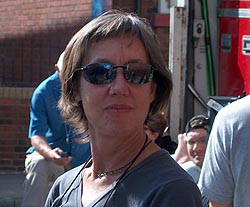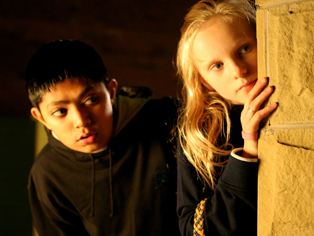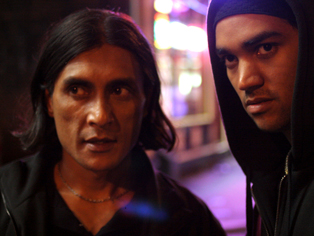Mischief Night
 From the striking opening credits, with a boy throwing eggs at the
screen, you know that Mischief Night is going to live up to its name.
From the striking opening credits, with a boy throwing eggs at the
screen, you know that Mischief Night is going to live up to its name.
It is both an irreverent look at life in a Leeds suburb, as well as an exploration of the effects of increased ethnic segregation. The setting of Beeston, Leeds – home of three of the July 7th bombers – also provided the backdrop to Penny Woolcock’s earlier features, Tina Goes Shopping (1999) and Tina Takes a Break (2001). Woolcock says: “people used to live together in Leeds,” but now, “these are scary times in which divisions between people are leading to terrible bloodshed.” Characters in Mischief Night also share the director’s concerns; as Tina Crabtree says, “things were different in the olden days, a bit more mixed.” Mischief Night, through the many strands of the characters’ interconnected stories, shows that these “divisions” are largely meaningless.
Even the music in the film reflects this need to break down barriers. The film opens with a Bollywood-style song and ends with a Hindi version of the very appropriate ‘I Will Survive’. In between, different styles of music are used to both demarcate different parts of the town. This device is used to provide contrast between the introductions of the Crabtrees and the Khans, despite the fact that both families are alike in their everyday dysfunctionality.
 The film also looks remarkably colourful. Woolcock says that she deliberately
went for a different look to the “very real and gritty feel” of the first two Tina
films. Surprising splashes of colour, such as the bright blue peacocks in
Tina’s dad’s garden, and the vibrant red of his hot air balloon, give Beeston
an exotic look at times. The use of colour adds to the comic, larger-than-life
aspect of the film, and is also linked to the overall themes of
multiculturalism versus segregation.
The film also looks remarkably colourful. Woolcock says that she deliberately
went for a different look to the “very real and gritty feel” of the first two Tina
films. Surprising splashes of colour, such as the bright blue peacocks in
Tina’s dad’s garden, and the vibrant red of his hot air balloon, give Beeston
an exotic look at times. The use of colour adds to the comic, larger-than-life
aspect of the film, and is also linked to the overall themes of
multiculturalism versus segregation.
As Tina notes, her children’s generation “travel miles to go to school with their own kind,” whereas her classmates included Immie, Qassim and Darren Haq. In a similar way, Woolcock’s vision of Leeds is no stereotypical “grim up north” grey.
This intricacy is reflected in the multi-strand structure of the film. Despite the growing divisions between the ethnic groups, circumstance forces the characters to come into contact with each other. Kimberley’s search for the father she thought was dead is a narrative thread that also provides the impetus for Tina, Asif and Immie’s adventures.
 Unsurprisingly, those with extreme, divisive views are treated in the
harshest way possible: by appearing ridiculous to the audience. Darren Haq,
“the eyepatch imam,” is in charge of teaching the young Muslim boys of Beeston
about their religion, but his methods include showing them “jihad videos”
(greeted with a chorus of “yays!”) and expounding on his own questionable
beliefs. Yet, the Darren Tina remembers from school was just a normal Leeds lad who had an
eye for the ladies and enjoyed a drink.
Unsurprisingly, those with extreme, divisive views are treated in the
harshest way possible: by appearing ridiculous to the audience. Darren Haq,
“the eyepatch imam,” is in charge of teaching the young Muslim boys of Beeston
about their religion, but his methods include showing them “jihad videos”
(greeted with a chorus of “yays!”) and expounding on his own questionable
beliefs. Yet, the Darren Tina remembers from school was just a normal Leeds lad who had an
eye for the ladies and enjoyed a drink.
It is Tina’s dad Don, when speaking to his grandson Tyler, who hits upon a possible reason for the changes in Beeston over the last generation: “What do you see? Nowt but poverty.” Although he is not referring to ethnic divisions here, he is telling Tyler that he felt a need to escape from his beginnings, and that was only possible through making money.

(note - ending details follow - ed)
It is in the last act that the tone of Mischief Night becomes uneasy. Whereas both the gripping and the humorous elements of the story have been treated with a light touch, the characters are shoehorned into convenient scenarios that allow for the predictable confrontation between Kimberley and her father, who turns out to be Qassim. She shoots him just as Tina shouts, “He’s your Dad!"
This melodramatic climax is a disappointment because it gives a simple, neat ending to a story that has tackled a number of thorny, complex problems. The last shot of the film sees Kimberley and Asif walking off into the sunset hand-in-hand, signifying the hope for greater harmony in the future. Woolcock’s film has one major solution for the problems of Beeston: learn to integrate again. However, Mischief Night offers no more guidance than that.
Click here for more information on Mischief Night
To contact the author: